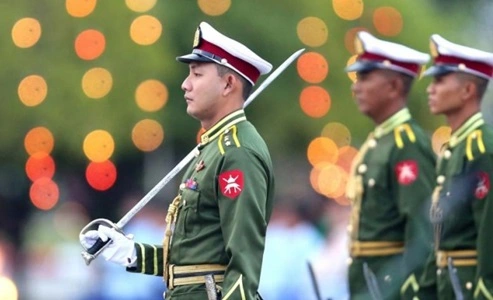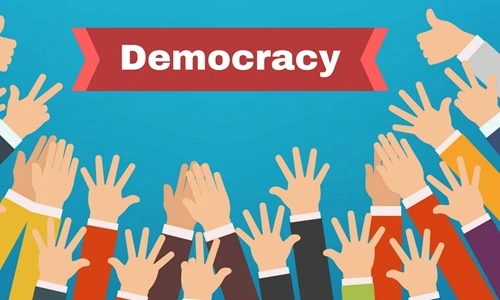Military rule, where the government is controlled by the armed forces, often emerges in countries experiencing political instability, corruption, or civil unrest. A simple way to think of it is the situation in which the army says: ‘Now we are in charge.’ In this configuration, elections cease to matter, the constitution is suspended, and the government rules by decree. Instead of the usual bureaucratic processes, a small group of military officials make the decisions for the country.
This phenomenon appears frequently in developing countries, especially during periods of upheaval when the military inserts itself to ‘restore order and stability’, all the while propping up some of its own judicial processes, facilitating limited opportunities for voters to cast ballots, and sometimes holding on for years while maintaining a monopoly on power. However, disrespect for human rights and civil liberties can sometimes follow.

Simply put, in a military regime, they enforce laws strictly and implement policies quickly. Or that’s the theory. However, given the inherent centralisation of power, military regimes are especially vulnerable to economic mismanagement and graft. The leader can start acting above the law, making ‘decisions’ without genuine oversight, and then proceeding to engage in corrupt practices.
Now Let’s understand the advantages and disadvantages of military rule:
Advantages of Military Rule
1. No Bureaucratic Hassles
A key advantage of military rule is the rapidity with which decisions can be made. In civilian governments, decision-making can be painfully slow because it requires endless approvals and adherence to protocols. Military rule is far less revolving, power is concentrated, so the decision can be taken and implemented.
2. Tighter Grip on Corruption
See, with a hierarchical, disciplined, and orderly structure, military generals could introduce rigorous anti-corruption measures without the typical delays and complications. This isn’t to say that such forms of government are free from corruption, but that centralized control in military rule could allow for significant reductions in corruption.
3. Discipline and Order Everywhere
It’s true that military rule tends to be a strict rule, with total control, and very little illegal activity is tolerated. And yes, if there is a crime committed by anyone, he/she can face severe punishment for that compared to the regular government procedures.
4. Merit Over Connections
Another advantage of military government is that the men in leading positions are commonly chosen on the basis of merit, rather than political affiliation and nepotism characterizing the formation of civilian cabinets.
5. Bringing Stability in Chaos
And yes, militaries always have the capacity to take full control of national governments by force, a process in which democratic governments have to not only relinquish power but also their legitimacy as well. All in all, with a more streamlined way of processing things and making decisions, military rule can very well make things stable, even in chaotic situations.
6. Efficient Crisis Management
Certainly, an autocracy will be better in natural disaster or economic crisis management due to its vertical structure and fast decision-making. The military governments are not well suited to democratic governance however they are better at mobilizing resources and implementing necessary actions on short notice to mitigate the effects of natural disasters, economic crises, or security threats.
Disadvantages of Military Rule
1. No Basic or Human Rights
See, one of the biggest issues with military rule in a country is that when such governance is implemented, there are no basic or human rights that are respected. You can’t simply oppose the government aka the military in such conditions, or else, you’ll be locked up and even tortured. And it is not like this is some theory or anything like that, there have been many cases where this has been done in countries like Pakistan.
2. No Fair Play in Law
In military regimes, there is no independent judiciary, laws aren’t applied in an even-handed manner to all, and military leaders may not even be subject to the laws. This kind of legal structure actually goes on to create more injustice in society which the general public may not like.
3. No Voting, No Voice
Simply put, forget about periodic elections under military rule. Citizens don’t get to vote for their leaders, which means there’s a serious lack of accountability and representation. This can lead to long periods of nongovernmental rule, with public consent continuing only so long as a new coup or regime change is kept at bay.
4. Economy Takes a Hit
Notoriously, military governments are prone to economic disasters, as they put defense spending ahead of development. For the military as the governing power, it is going to be the defense budget that is going to be the main priority, which can very well lead to economic decline over time.
5. Instability and More Coups
In addition, military rule can produce stability only in the short term. It has been seen that once military rule is put into action, there can be more rivalries in different groups of the country, which ultimately leads to more coups and political instability down the line.
6. No Accountability, Lots of Corruption
It is somewhat true that military leaders don’t answer to the public, so even democratic armed forces could become powerful without meaningful institutional constraints on the exercise of that power, and therefore vulnerable to abuse. Without institutions able to hold armed forces accountable to public oversight or democratic control, corruption, human rights abuses and other forms of misconduct can rise without significant barriers.
7. Cultural and Educational Downfall
It is often seen that military regimes suppress cultural expression and educational progress in the country. That’s why there is always a strong possibility that military needs have a higher priority than a nation’s cultural legacy and its work to develop an educational system.
Quick Comparison Between Advantages and Disadvantages of Military Rule
| Advantages | Disadvantages |
| Fast decision-making | Suspension of basic human rights |
| In Theory, Reduced corruption | Lack of an independent judiciary |
| High levels of discipline and order | Absence of elections and democratic voice |
| Merit-based leadership | Economic decline due to prioritizing defense |
| Restores stability in chaotic situations | Short-term stability, prone to more coups |
| Effective crisis management | Unaccountability and potential for corruption |
| Suppression of cultural and educational growth |


